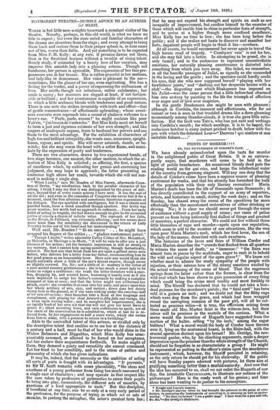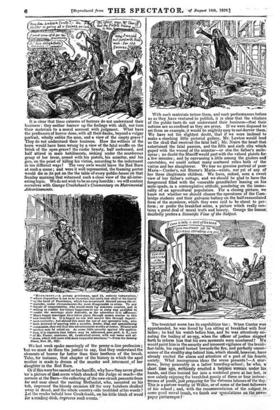POINTS OF HORROR!! !!
OR, THE PICTURESQUE OF CORDER'S CASE.'
—
WE have already animadverted upon the taste for murder in the enlightened public of Great Britain. It is so extrava- gantly eager, that murderers will come to be held in the light of public benefactors. An occasional bloody deed puts the reading world on the qui vive, and keeps the intellectual water of the country from growingstagnant. Will any one deny that the details of Corder's crime have been a copious source of pleasing excitement for weeks, and that his atrocity has furnished the bulk* of the population with their only literary recreation ? Maria Marten's death has been the life of thousands upon thousands ; it has directly contributed to the support of an army of reporters. artists, and historians in small, during the week days; and on the Sunday, has chased away the ennui of the operatives far more effectually than the accustomed restoratives of either drinking or driving. No; it is clear we should never get through the cares of existence without a good supply of crime; our cases of police prevent us from being nationally that dullest of things and greatest of monsters, a perfect character. We could not live without those little blemishes of rape 'and murder—spots upon our reputation, which seem to add to the number of our attractions, like the wen upon poor Maria Marten's neck., which her first lover, the son of the lady of the manor, described with such exactness. The historian of the loves and fates of William Corder, Maria Marten describes the "crowds that flocked from all quaters to witness the scene of death," as " immense :" " the Barn was almost torn in pieces by the multitude, eager to rush in to behold the wild and singular aspect of the open grave'." We know not whether most to admire the ready sympathy of the people with injustice, or their intense love of the strong emotions excited by the actual witnessing of the scene of blood. That the eagerness springs from the latter rather than the former, is clear from the wild zeal which has been shown to gain possession of every thing which could bring the crime most readily and most forcibly 'to mind. The Sheriff has declared that he would not take a hun- dred guineas for the murderer's pistols ; the "fatal cord" has been sold at a guinea an inch ; and we doubt not that the filthy rags which were dug from the grave, and which had been wrapped round the corrupting remains of the poor girl, will all be col- lected as precious relics—it is true, the effluvium arising from them made old Mrs. Marten faint in the witness-box, but their odour will be precious in the nostrils of the curious. What a scene would the invention of Hogarth have suggested from the auction of the halter, selling "by the inch," among the eager bidders ! What a moral would the body of .Corder have thrown over it, lying on the anatomical board, in the Shire-hall, with the crucial operalion distinct upon his breast! Mr. Orridge, the con- troversial gaoler, who, by his clinching arguments, made a deeper. Impression upon the prisoner than the whole strength of the Church,' should not be forgotten in so characteristic a group.1- He might be represented as putting in the officer's claim upon the murderous instrument; which, however, the Sheriff persisted in retaining, as the only return he should get for his shnevalty. If the public will have Sunday papers adorned with pictures, let them aim at gratifying something better than a morbid curiosity. And now that the i ea has occurred to us, shall we not enlist the Hogarth of our day, the inimitable CRON:SHANK, to illustrate our notions of the picturesque? Here is the ready work of his genius ; and time alone has been wanting to do justice to his conception.
• Knight and Lacey's vennon. t Mr. Orridge's alacrity when he had brought the prisoner to thdpoint or con: Cession, in procuring the instruments of recording it, is amnsingas Well as praise- worthy. " He then exclaimed ' am a guilty man.' I then went for a pea and ink, &c. &e,"—Sea Orridoe's Statement. It is clear that these caterers of horrors do not understand their business : they neither harrow up the feelings with skill, nor turn their materials to a moral account with judgment. What have the professors of horror done, with all their daubs, beyond a vulgar portrait, wholly unlike the man, and a view of the empty grave ? They do not understand their business. How the withers of the town would have been wrung by a view of the fatal scuffle on the brink of the open grave! the rustic beauty, half undressed, and half attired in male habiliments, sinking under the murderous grasp of her lover, armed with his pistols, his scimitar, and his gun, on the point of killing his victim, according to the indictment in ten different ways! The very owls would leave the Red Barn at such a scene ; and were it well represented, the foaming porter would die in its pot on the the table of every public-house on that Sunday morning that witnessed such a close view of the all-inter- esting topic. We do not wish to be so very horrible : we will content ourselves with George Cruikshank's Commentary on Matrimonial Advertisements.
"MATRIIIONY.—A private gentleman, aged 24, entirely Independent, I " whose disposition is not to be exceeded, has lately lost chief of his family " by the band of Providence, which has occasioned discord among the re- " malnder, under circumstances the most disagreeable to relate. To any " female of respectability, who would study for domestic comfort, and is " willing to confide her future happiness to one is every spay qualified to render the marriage state desirable, as the advertiser is in affluence.' " Many happy marriages have taken place through means similar to this " now resorted to. it Is hoped no one will answer this through imperti- nent curiosity; but shOuld this meet the eye of anyle lady, who " feels desirous of meeting with a sociable, tender, knt and sysapathising " companion, they will find this advertisement worthy of notice. Honour and " secrecy may be relied on. As some little security against idle applica. tion, it Is requisite that letters may be addressed, post paid, A. Z„ care " of Mr. Foster, stationer, 68, Leadenhall-street, with real name and ad- " dress, which will meet with most respectful attention."—From the Sunday rteses. Nov.25, 1927.
We last week spoke sneeringly of the penny-a-line profession ; but we must do them the justice to say, that they understand the elements of horror far better than their brethren of the brush. Take, for instance, that chapter of the history in which the aged mother is made to dream of the murder and interment of her daughter in the Red Barn. Or if this were too sacred or too horrific, why have they never given us 'a picture of that scene which shocked the Judge so much—the sermon at the Barn—the collecting of the awe-struck peasants from far and near about the ranting Methodist, who, mounted on his tub, improved the bloody occasion till the very butchers skulked away in dread, and the whole country-side trembled at his words? Let the reader behold how Cruikshank, on his little block of wood for a reading-desk, improves such events, ." With such materials before them, and such performances before us as they ,have ventured to publish, it is clear that the vitiators of the public taste do not understand their business—that their,' notions are as confined as they are gross. If we were disposed to set them an example, it would be mightily easy to out-horror them.' We have not the slightest doubt, that if we were inclined to make a shocking little pictorial gallery, Mr. Lawton would lend us the skull that received the fatal ball ; Mr. Nairn the heart that entertained the fatal passion, and the fifth and sixth ribs which gaped with the wound of the scimitar—or else the father's mole- spear ; no doubt the Sheriff would part with the valued pistols for a few minutes ; and by canvassing a little among the gaolers and constables, we could collect many scattered relics both of the victim and her slaughterer. We fear no genuine portrait of poor Maria—Corders, not Sterne's Maria—exists, nor yet of any of her three illegitimate children. We have, indeed, seen a sweet view of her father's cottage, and we should be glad to have the foreground filled with the venerable grandfather leaning on his mole-spade, in a contemplative attitude, pondering on the immo- rality of an agricultural population. For a closing picture, we know not whether we should choose the operations of the Cam-, bridge students and their galvanic battery on the half-resuscitated form of the murderer, which they were said to be about to per- form ; or prefer the breakfast scene, a picture which really con-' tains a great deal of moral truth and beauty. George the limner, decidedly prefers a Scientific View of the Subject.
The breakfast scene has its capabilities too :. When Corder was apprehended, he was found by Lea sitting at breakfast with four ladies ; he had his watch before him, and he was attentively mi- nuting the boiling of an egg, when the officer of justice. stepped • forth to inform him that his own moments were numbered! We would paint him in the security and innocent vigilance of the break- fast-table, his regard turned towards the fire, and perfectly uncon- scions of the stealthy step behind him, which should, however, have already excited the alarm and attention of a part .of his female, society. What incongruous ideas the scene presents !—A mnr- derer, living peaceably in a ladies' boarding-school ; he who, a' short time ago, ruthlessly crushed a helpless woman: tinder his hands, and then hurried her into a. wretched grave at her feet, is now calmly enjoying the breakfast gossip of three or four initruc-, tresses of youth, just preparing for the Virtuous labours of the day.' This is a picture worthy of Wilkie, or of some of the best followers of his school ; and, with the recommendation of the subject to , some good moral brush, we finish our speculations on.the,news, paper picturesque



















































































































 Previous page
Previous page